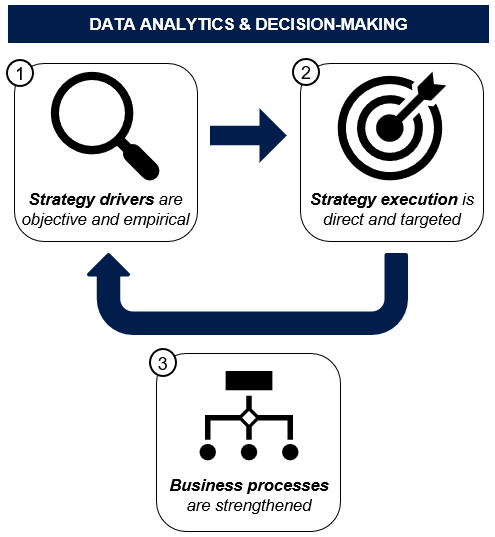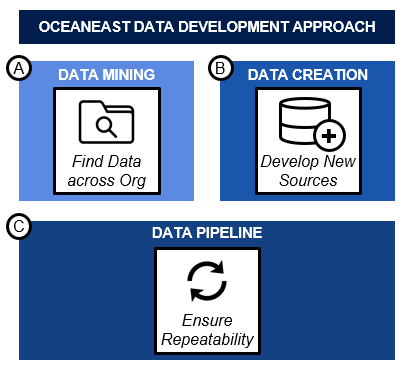By Ali Jutha, Director of Data Analytics, Oceaneast Associates, Inc.
The immediate benefits of integrating data into an organizational approach are clear – all views, claims, and ideas may be readily validated and compared.
However, analytics brings a range of secondary benefits, further positioning it as a focus area for burgeoning organizations: not only are (1) decisions bound to be objective, but (2) their outcomes are naturally action-oriented and (3) integration strengthens organizational processes.
In fact, organizational gains become exponential over time. Oceaneast worked with an innovative federal agency who shared that as this self-feeding loop recurred quarterly, data-driven endeavors became more reliable and more thorough over time.

1. Data-backed evidence is empirical in nature
A key feature of integrating analytics into an organization’s strategic approach is the objective nature by which all phases in the decision-making process are affected:
- Assessment: observed trends transparently reflect the state of the organization;
- Decision-making: strategic decisions are viewed as objective reactions to the landscape;
- Tracking: continued analysis over time empirically reflects the firm’s progress.
It is critical that data is integrated evenly across all parts of the decision-making process – one agency which Oceaneast encountered lacked a significant tracking function causing an inability to determine progress or inform future decisions. Ideally, actions derived from data-driven insights receive that same degree of objective substantiation across their full lifecycle.
Data integration also supports all phases by removing hypotheses & subconscious biases from the decision-making process, replaced by objective data & measurable trends. The forced quantification of perceived benefits and risks allows for direct comparison of strategic options and drives confidence in the selected path.
Data-oriented strategies are still feasible in organizations where data isn’t plentiful or accessible. Oceaneast’s approach is designed to assemble a robust and repeatable data pipeline regardless of an organization’s initial state.
2. Data-driven strategies are naturally action-oriented
Since observed metrics are behind strategic decisions, it is easy to achieve consensus when selecting key performance indicators (KPIs) to quantify the impact of various efforts. Given that specific data inputs dictate these KPI metrics, decision-makers can readily determine which drivers of trends to prioritize based on expected impact on KPI movement. Not only will actions be naturally designed to improve metrics and drive execution, but an approach steeped in data ensures that goals are reasonable and possible to attain. The long-term cycle of using data to set direction informs all stakeholders of realistic timelines needed to achieve various metrics.
Beyond informing the approach and goals, KPI movement also objectively measures progress over time. By tracking strategic success directly against numeric milestones, the organization develops a self-assessment mechanism. Since the ingredients to these KPIs are transparently available, any stakeholder can play a role in keeping the organization accountable as efforts progress.
With KPIs directly reflecting strategic objectives and efforts designed directly to move KPIs, the process of data integration yields an impact-first approach.
3. Data integration strengthens business processes
A critical aspect of consolidating and centralizing data within an organization is that all inputs to decisions become fully visible. With the knowledge that stakeholders can re-create and test analyses, leaders respond to the increased transparency by crafting approaches which may thrive in the firm’s new culture of honest self-evaluation. By building a system of accountability, it becomes easier for leaders to gain support for efforts and to maintain cohesion in pursuing them. While increased transparency can aid any decision-making process, it is the introduction of a platform that empowers stakeholders to keep decision-makers honest and brings increased ownership to the process.
With initial efforts limited to data which is readily available, stakeholders are driven by early returns to invest in stronger business processes and drive toward a more robust data approach. One client agency Oceaneast supported found that with data at the focus of the enterprise, it became a shared group ethos to enhance & maintain business processes.
As stakeholders were inspired to contribute to and maintain the data pipeline, the organization benefitted in the long-term from stronger and more thorough processes surrounding future data endeavors.
Data-intensive strategies can be adopted even when organizations don’t have an abundance of high quality data. Oceaneast’s approach is designed to develop a thorough and complete process, taking any enterprise from its current state to a robust end state.

(A) Assess organization by consolidating available data:
- Disparate sources are standardized & aligned centrally in a data warehouse
- Data is enhanced via technical methods (text mining, digitizing, and natural language processing)
(B) Create new data sources to fill in knowledge gaps:
- Capture full scope of business by developing new data sources (stakeholder surveys and scoring systems)
- Develop forward-looking metrics via projections, forecasting, and estimation
(C) Ensure continuity & repeatability via data pipeline:
- Enhance capture processes for old/new sources for robust data collection
- Automated data validation to ensure accurate inputs and long-term system maintenance.





